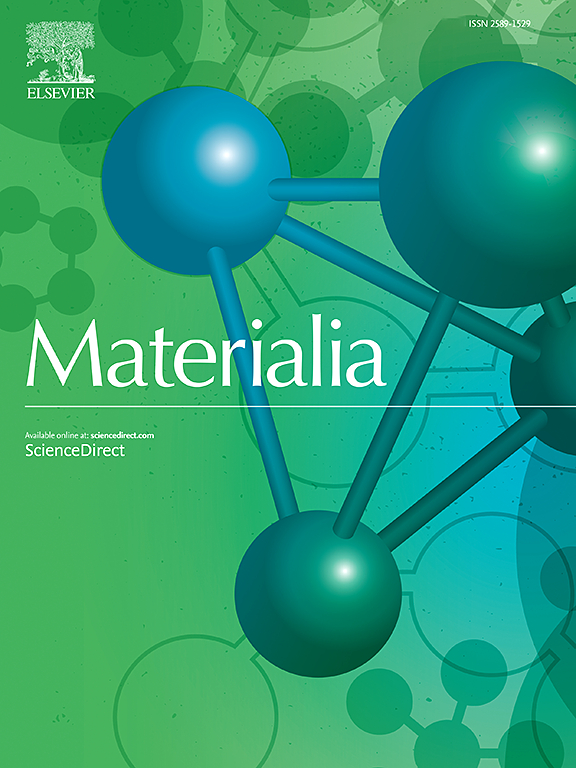Tuning of magnetic properties and half-metallicity of electrodeposited Co-Fe-Sn Heusler alloy films by varying elemental composition
IF 3
Q2 MATERIALS SCIENCE, MULTIDISCIPLINARY
引用次数: 0
Abstract
In an attempt to invoke half-metallicity in non half-metallic Co2FeSn alloy by bandgap engineering, off-stoichiometric Co48.5Fe22.8Sn28.7 (S1), Co51.7Fe21.6Sn26.7 (S2), and Co53.8Fe20.6Sn25.6 (S3) alloy films were electrodeposited on polycrystalline copper substrate. L21-type ordered structure could be achieved in 1400 nm thick films after heat treatment at 550 °C for 1 hour. The processed films exhibited tunable soft ferromagnetic nature with high Curie temperature (∼1100 K) and high effective anisotropy constant (∼106 erg/cc). The magnetic moment of the films varied with composition. Ab initio calculations showed the finite density of states at the Fermi level (EF) could not be completely suppressed in S1 and S2 alloys, while S3 exhibited a full bandgap in the minority band at EF. Half-metallic nature of S3 was validated by temperature-dependent electrical resistivity data and Rhodes-Wohlfarth ratio estimated from thermomagnetization measurement. Apart from showcasing a method to induce half-metallicity in these ternary alloy films, this study has identified the Co53.8Fe20.6Sn25.6 alloy film as a promising candidate for spintronic and high-temperature magnetic device applications.

改变元素组成对电沉积Co-Fe-Sn Heusler合金薄膜磁性能和半金属丰度的影响
为了利用带隙工程的方法激发非半金属Co2FeSn合金的半金属性,在多晶铜衬底上电沉积了非化学量Co48.5Fe22.8Sn28.7 (S1)、Co51.7Fe21.6Sn26.7 (S2)和Co53.8Fe20.6Sn25.6 (S3)合金薄膜。在550℃热处理1小时后,在1400 nm厚的薄膜上可以得到l21型有序结构。处理后的薄膜具有高居里温度(~ 1100 K)和高有效各向异性常数(~ 106 erg/cc)的可调软铁磁性。薄膜的磁矩随成分的不同而变化。从头计算表明,S1和S2合金在费米能级(EF)的有限态密度不能被完全抑制,而S3在EF的少数能带中表现出完整的带隙。通过温度相关电阻率数据和热磁化测量估计的Rhodes-Wohlfarth比验证了S3的半金属性质。除了展示了在这些三元合金薄膜中诱导半金属丰度的方法外,本研究还确定了Co53.8Fe20.6Sn25.6合金薄膜是自旋电子和高温磁性器件应用的有前途的候选材料。
本文章由计算机程序翻译,如有差异,请以英文原文为准。
求助全文
约1分钟内获得全文
求助全文
来源期刊

Materialia
MATERIALS SCIENCE, MULTIDISCIPLINARY-
CiteScore
6.40
自引率
2.90%
发文量
345
审稿时长
36 days
期刊介绍:
Materialia is a multidisciplinary journal of materials science and engineering that publishes original peer-reviewed research articles. Articles in Materialia advance the understanding of the relationship between processing, structure, property, and function of materials.
Materialia publishes full-length research articles, review articles, and letters (short communications). In addition to receiving direct submissions, Materialia also accepts transfers from Acta Materialia, Inc. partner journals. Materialia offers authors the choice to publish on an open access model (with author fee), or on a subscription model (with no author fee).
 求助内容:
求助内容: 应助结果提醒方式:
应助结果提醒方式:


